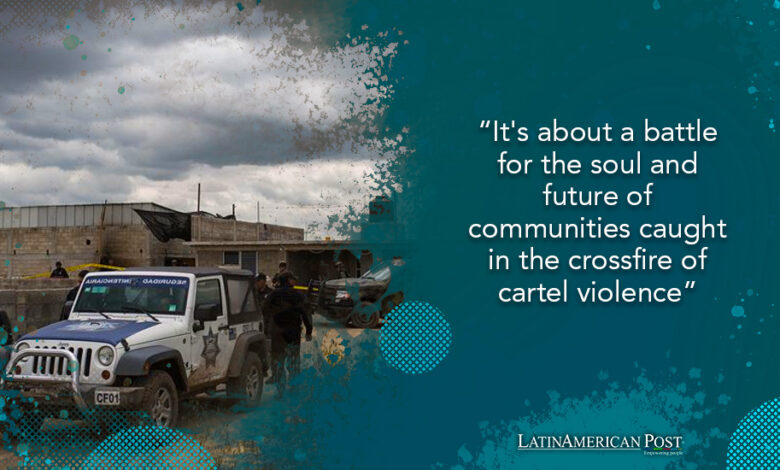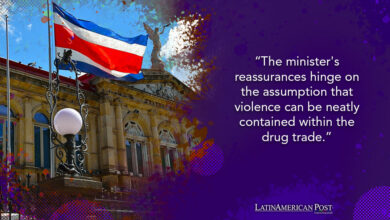Urgent Call for Action to Tackle Cartel Influence in Mexico

In light of recent events showcasing public support for drug cartels in Mexico, it becomes imperative for the government to intensify its efforts against this glamorized, violent, and poverty-inducing menace.
A Complex Societal Struggle
The recent call by Mexico’s President Andrés Manuel López Obrador for citizens to resist supporting drug cartels, coupled with his push against the opposition to National Guard barracks, throws into sharp relief a complex and deeply rooted issue plaguing Mexican society. This issue is not just about law enforcement; it’s about a battle for the soul and future of communities caught in the crossfire of cartel violence, poverty, and a glamorized criminal culture.
In the southern state of Chiapas, recent social media videos disturbingly show villagers cheering on convoys of Sinaloa Cartel gunmen. This chilling display is not a simple case of public support for criminal enterprises. It’s a symptom of a much deeper malaise: the intertwining of fear, poverty, and a distorted perception of power and protection that these cartels offer.
When people cheer for those who bring violence and disruption into their lives, it is a clear sign of how deeply these criminal organizations have embedded themselves into the fabric of these communities.
López Obrador’s Response: A Step in the Right Direction but Falling Short
President López Obrador’s response, focusing on military and National Guard deployments, is a step in the right direction but falls short of addressing the multifaceted nature of the problem. The quasi-military National Guard has been the centerpiece of law enforcement in Mexico. Yet, critics argue that this has come at the expense of civilian police forces, often better suited to investigate and prevent crime. Furthermore, local opposition to the construction of National Guard barracks – on grounds of environmental, cultural, or efficacy concerns – complicates the situation.
The president’s assertion that opposition to these barracks equates to supporting criminals is a dangerous oversimplification. This narrative overlooks the legitimate concerns of the residents and risks alienating those who are caught between the hard place of cartel intimidation and the rock of governmental pressure. It also fails to recognize the nuanced reality of people living under the shadow of these cartels for years, forced into a form of coerced coexistence.
Residents Fleeing Cartel Shootouts and Governmental Pressure
The plight of residents fleeing their homes in Chiapas following cartel shootouts underscores the urgency of the situation. These people are not merely statistics in a government report; they are families, like Mauricio Gómez and his relatives, seeking refuge from a life marked by gunfire and fear. Their desperate flight in boats across the Angostura dam reservoir is a stark testament to the failure of current strategies to provide security and stability.
The glamorization of cartel culture, as disturbingly seen in the public support for these criminal groups, needs to be dismantled. This requires an approach that goes beyond military might. It necessitates an engagement with these communities’ cultural and social fabric, offering alternatives to the allure of the cartel lifestyle. Educational initiatives, economic opportunities, and community-building efforts are critical. They provide a counter-narrative to the perceived power and prosperity offered by the cartels.
Addressing Root Causes
Moreover, tackling the root causes of poverty in these regions is essential. Poverty creates a fertile ground for the cartels to recruit and retain support. Without addressing the socioeconomic disparities, any attempt at eradicating cartel influence will be akin to cutting the branches of a weed, leaving the roots intact to sprout anew.
Also read: Haiti’s Protests are A Desperate Plea Beyond Political Boundaries
The government’s role in protecting its citizens from cartel violence and influence cannot be overstated. However, this protection must come in a form that is respectful and mindful of the communities’ needs and concerns. Expanding military forces at the expense of community-oriented policing and local governance is not the answer. A more holistic approach is required, encompassing social, economic, and cultural initiatives.
President López Obrador’s call for non-support of cartels is a necessary but insufficient step. The government needs to adopt a more comprehensive and nuanced approach that addresses the underlying causes of cartel influence: poverty, lack of opportunities, and the glamorization of criminal lifestyles. Only by acknowledging and tackling these root issues can Mexico hope to free its citizens from the grip of these violent and destructive forces.





